Safety Score: 3,0 of 5.0 based on data from 9 authorites. Meaning we advice caution when travelling to Germany.
Travel warnings are updated daily. Source: Travel Warning Germany. Last Update: 2024-08-13 08:21:03
Explore Geismar
The district Geismar of Göttingen in Lower Saxony is located in Germany about 162 mi south-west of Berlin, the country's capital.
If you need a place to sleep, we compiled a list of available hotels close to the map centre further down the page.
Depending on your travel schedule, you might want to pay a visit to some of the following locations: Rosdorf, Gemeinde Friedland, Waake, Rohrberg and Rustenfelde. To further explore this place, just scroll down and browse the available info.
Local weather forecast
Todays Local Weather Conditions & Forecast: 7°C / 44 °F
| Morning Temperature | 6°C / 43 °F |
| Evening Temperature | 5°C / 40 °F |
| Night Temperature | 4°C / 40 °F |
| Chance of rainfall | 6% |
| Air Humidity | 83% |
| Air Pressure | 1010 hPa |
| Wind Speed | Moderate breeze with 11 km/h (7 mph) from East |
| Cloud Conditions | Overcast clouds, covering 100% of sky |
| General Conditions | Moderate rain |
Monday, 18th of November 2024
2°C (36 °F)
1°C (35 °F)
Rain and snow, moderate breeze, overcast clouds.
Tuesday, 19th of November 2024
8°C (46 °F)
3°C (37 °F)
Rain and snow, strong breeze, overcast clouds.
Wednesday, 20th of November 2024
3°C (37 °F)
-0°C (31 °F)
Light snow, fresh breeze, overcast clouds.
Hotels and Places to Stay
Novostar First Class Garni
Eden-Hotel
Gebhards Romantik Hotel
IntercityHotel
Best Western Am Papenberg
Best Western Parkhotel Ropeter
Park Inn by Radisson
GDA Hotel Göttingen 3* Superior
Rennschuh
Schweizer Hof
Videos from this area
These are videos related to the place based on their proximity to this place.
The University of Göttingen for Scholars
Founded in 1737, the University of Goettingen is a research university of high international standing. It is well-known, not only for its remarkably diverse range of subjects, but also for...
Studying at the University of Göttingen: Introduction Days for International Students 2013
Every year, the University of Göttingen organises introduction days for new international students. These introduction days help the new students to get to know the University, the city of...
Aller Anfang ist schwer? Nicht an der Uni Göttingen!
Was sind eure ersten Eindrücke von Göttingen? Wie lief die O-Phase? Warum die Göttingen als Studienstadt? Das und viel mehr haben wir Erstis bei der Imma-Feier gefragt. "Das ist ihr Tag",...
R. v. Weizsäcker: Studienzeit in Göttingen
Altbundespräsident Richard von Weizsäcker spricht über seine Studienzeit an der Universität Göttingen. Auszug aus einem Gespräch mit Prof. Dr. Arnulf Quadt, Fakultät für Physik, und...
Löschzug BF Göttingen Hauptfeuerwache [+ Alarmgong + DME Alarm] (HD)
Einsatz für die Berufsfeuerwehr (BF) Göttingen. Von der Hauptwache, rückt aus der Löschzug bestehend aus dem Einsatzleitwagen (ELW) und zwei Hilfeleistungslöschfahrzeugen (HLF 24//20-2)...
Studieren in Goettingen
Warum es sich lohnt, in Göttingen zu studieren, erfährst Du hier. Forschen, Freunde finden und Fahrrad fahren -- die kleine Großstadt und ihre Uni haben für jeden etwas.
Mathe studieren in Göttingen
Du hast Lust auf Knobeln, Teamarbeit und eine angenehme Atmosphäre zum Studieren? Dann bist du bei den Mathematikerinnen und Mathematikern in Göttingen genau richtig. Studierende und ...
Göttingen und die Quantenmechanik: Born, Heisenberg, Hund
Prof. Dr. Kurt Schönhammer über "Göttingen und die Quantenmechanik: Born, Heisenberg, Hund". Vortrag im Rahmen der öffentlichen Ringvorlesung "Sie befruchtet und ziert" am 13. November...
An die Uni, fertig, los! Vorkurse an der Uni Göttingen
Die Universität Göttingen bietet für viele Studienfächer bereits VOR Beginn des Semesters Lehrveranstaltungen und Übungen für Erstis an. Und das hat viele VORteile: Überprüfe deinen...
Herzlich Willkommen in Göttingen
Wir begrüßen alle neuen Studentinnen und Studenten an der Universität Göttingen. Am 20. Oktober 2014 fand im Zentralen Hörsaalgebäude die Immatrikulationsfeier statt. Wir haben die Veranstalt...
Videos provided by Youtube are under the copyright of their owners.
Attractions and noteworthy things
Distances are based on the centre of the city/town and sightseeing location. This list contains brief abstracts about monuments, holiday activities, national parcs, museums, organisations and more from the area as well as interesting facts about the region itself. Where available, you'll find the corresponding homepage. Otherwise the related wikipedia article.
Göttingen (district)
Göttingen is a district in Lower Saxony, Germany. It is bounded by (from the north and clockwise) the districts of Northeim and Osterode, and by the states of Thuringia and Hesse.
University of Göttingen
The University of Göttingen (German: Georg-August-Universität Göttingen, GAU), known informally as Georgia Augusta, is a university in the city of Göttingen, Germany. Founded in 1734 by George II, King of Great Britain and Elector of Hanover, it opened for classes in 1737. The University of Göttingen soon grew in size and popularity. Göttingen is a historic university city, with a high student and faculty population.
Albanifriedhof
Albanifriedhof is a cemetery in Göttingen, Germany just outside the city wall to the southeast. It is most famous as the final resting place of Carl Friedrich Gauss. The cemetery is named after St. Albani Evangelical Lutheran Church in Göttingen.
Gänseliesel
The Gänseliesel is a fountain which was erected in 1901 in front of the mediaeval town hall of Göttingen, Germany. Although rather small in size, the fountain is the most well-known landmark of the city. Today, it is an essential part of the graduation celebrations for every student who finishes a doctorate at the George August University Göttingen to climb the fountain and to kiss the statue of the goose girl.
Göttingen State and University Library
The Göttingen State and University Library (German: Niedersächsische Staats- und Universitätsbibliothek Göttingen or SUB Göttingen) is the library for Göttingen University as well as the central library for the German State of Lower Saxony (with its central catalogue), and the library for the Göttingen Academy of Sciences.
SS. Peter and Paul's Church, Göttingen
The Paulinerkirche in the historic city center of Göttingen was completed as a minster in 1304. Today it serves as a convention and exposition centre for the Göttingen State and University Library. In 1294 the Dominican Order was permitted to settle in Göttingen and started to build a monastery in the western part of the city center. The minster was constructed in the style of a gothic hall church typical for the order.
Sammlung für Völkerkunde
The Sammlung für Völkerkunde (German for Ethnological Collection) at the Institute of Cultural and Social Anthropology of the University of Göttingen is one of Germany's most important ethnological collections. The museum was founded around 1780 and revived around 1930, and is now funded by the state of Lower Saxony.
Nikolausberg
Nikolausberg is a northeastern borough of the university town of Göttingen, Germany. Its name derives from a legend according to which three pilgrims came to the church in 999 AD, of whom one left relics of Nicholas of Myra following his death there. However, the name Nikolausberg has apparently been used only from the 17th century. The village was originally known as Ulrideshusen, with other variants recorded as Adelratheshusen, Ulradeshusen, Olerdeshausen, and Olrikshusen.
Max Planck Institute for Experimental Medicine
The Max Planck Institute of Experimental Medicine is located in Göttingen, Germany. It was founded as Kaiser Wilhelm Institute for Medical Research in 1947, and was renamed in 1965. It is one of 80 institutes in the Max Planck Society (Max Planck Gesellschaft). {{#invoke:Coordinates|coord}}{{#coordinates:51|33|4|N|9|56|14|E|type:landmark |primary |name= }}
Jahnstadion (Göttingen)
Jahnstadion is a multi-use stadium in Göttingen, Germany. It is used mostly for football matches and serves as the home of the RSV Göttingen 05. The stadium holds 17,500 people
Göttingen Academy of Sciences
The Göttingen Academy of Sciences (in German Akademie der Wissenschaften zu Göttingen) is the second oldest of the seven academies of sciences in Germany. It has the task of promoting research under its own auspices and in collaboration with academics in and outside Germany. It has its seat in the university town of Göttingen.
Max Planck Institute for the Study of Religious and Ethnic Diversity
The Max Planck Institute for the Study of Religious and Ethnic Diversity (until 2007 Max Planck Institute for History) is located in Göttingen, Germany. It is one of 80 institute in the Max Planck Society (Max Planck Gesellschaft). The institute was founded in 1956. In March 2007 the Senate of the Max Planck Society decided to rename the Institute to Max Planck Institute for the Study of Religious and Ethnic Diversity.
Göttingen station
Göttingen railway station, known in German as Bahnhof Göttingen, is an InterCityExpress stop on Germany's domestic long-distance rail network and the only passenger station of the city of Göttingen. Built in 1854 as the terminus of the Hanoverian Southern Railway, the station lies west of the medieval town centre. The station today has four platform islands each with two through tracks. In addition there is a through track for goods traffic between the station building and the platforms.
Diemarden
Diemarden is a village in Gleichen in the Göttingen district of Lower Saxony, Germany. It had 1463 inhabitants as of 2005 and is the largest village in Gleichen. In 2006, there were 1078 residents eligible to vote. The village's elevation is 172 meters above mean sea level. The village lies along the Garte stream, a tributary to the Leine river.
German Primate Center
The German Primate Centre is a non-profit independent research and service institute. It is a member of the Gottfried Wilhelm Leibniz Scientific Community and funded by the federal government and by the states of Germany. In addition, about 40% of the total budget of €15 million comes from grants.
Reinhausen
Reinhausen is the largest village in the municipality (Gemeinde) Gleichen in the district Göttingen, Germany. It is also the seat of government for the Gleichen. The village has 1,500 residents (as of December 31, 2005). The village mayor is Manfred Kuhlmann. The village was settled in the tenth century or earlier. Along the main road running through the village are medieval cross-in-circles carved into the massive stone hillside.
Garte
The Garte is a small tributary to the Leine River in Lower Saxony, Germany. The Garte is a 23 km long stream that rises to the east of Weißenborn at an elevation of 303 m amsl. Towns that it runs through or by include Beienrode, Kerstlingerode, Rittmarshausen (where it is joined by the Bernsroder Bach), Wöllmarshausen, Benniehausen (where the Bischhäuser Bach joins it), Klein Lengden (where the Bramke and Eichbach join it), and Diemarden. The stream joins the Leine River south of Göttingen.
Forstbotanischer Garten und Pflanzengeographisches Arboretum der Universität Göttingen
The Forstbotanischer Garten und Pflanzengeographisches Arboretum der Universität Göttingen, often called the Forstbotanischer Garten und Arboretum, is a 40 hectares arboretum and botanical garden maintained by the University of Göttingen. It is located at Büsgenweg 2, Göttingen, Lower Saxony, Germany, immediately adjacent to the New Botanical Garden, and open to the public daily. The arboretum dates to 1870 when it was created as a forestry school by the Hannoversch Münden Faculty of Forestry.
Old Botanical Garden of Göttingen University
The Old Botanical Garden of Göttingen University (German: Alte Botanische Garten der Universität Göttingen or Alte Botanische Garten Göttingen), with an area of 4.5 hectares, is an historic botanical garden maintained by the University of Göttingen. It is located in the Altstadt at Untere Karspüle 1, adjacent to the city wall, Göttingen, Lower Saxony, Germany, and open daily.
Neuer Botanischer Garten der Universität Göttingen
The Neuer Botanischer Garten der Universität Göttingen (36 hectares), also known as the Experimenteller Botanischer Garten, is a research botanical garden maintained by the University of Göttingen. It is located immediately adjacent to the university's Forstbotanischer Garten und Arboretum at Grisebachstraße 1, Göttingen, Lower Saxony, Germany, and open daily without charge. The garden was established by Prof.
Herberhausen
Herberhausen is a village belonging to Göttingen, Lower Saxony, in Germany.
Göttingen Observatory
Göttingen Observatory (Universitätssternwarte Göttingen or königliche Sternwarte Göttingen) is a German astronomical observatory located in Göttingen, Lower Saxony, Germany.
Theater im OP
The Theater im OP (ThOP) is the university theater of Georg-August-Universität Göttingen. It was founded by the theatre section of the German Department. Its main objective is to give training and practical experience in theater. The theater's name refers to its location, which is the former medical operation room. This structure produces a virtual theater-in-the-round (bench seats are on the two larger, opposing sides and additional seats are often added on a third side.
Wendebach Reservoir
Wendebach Reservoir is an artificial lake with a surrounding recreation park (Erholungspark Wendebach) in the municipality of Gleichen and Friedland, Lower Saxony, Germany, about 8 km south of Göttingen. It is a popular summer outing goal for residents and students of Göttingen. There is a swimming beach and dock. In addition, there are some park facilities such as a first-aid post, grills, a food stall and outhouses. The reservoir is used by anglers.
Stadtfriedhof (Göttingen)
The old Stadtfriedhof (City Cemetery) in Göttingen is a historic cemetery with graves of important scholars. It is the final resting place of no less than eight Nobel Prize winners: Max Born, Otto Hahn, Max von Laue, Walther Nernst, Max Planck, Otto Wallach, Adolf Windaus and Richard Zsigmondy.



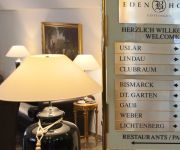
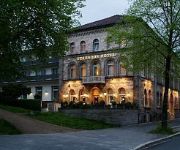
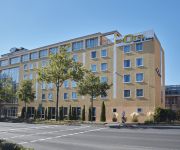



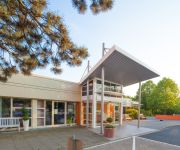
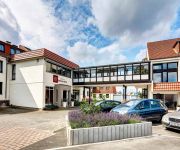
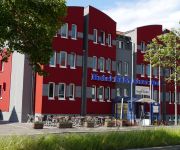





!['Löschzug BF Göttingen Hauptfeuerwache [+ Alarmgong + DME Alarm] (HD)' preview picture of video 'Löschzug BF Göttingen Hauptfeuerwache [+ Alarmgong + DME Alarm] (HD)'](https://img.youtube.com/vi/BpJ9C52iC4U/mqdefault.jpg)








